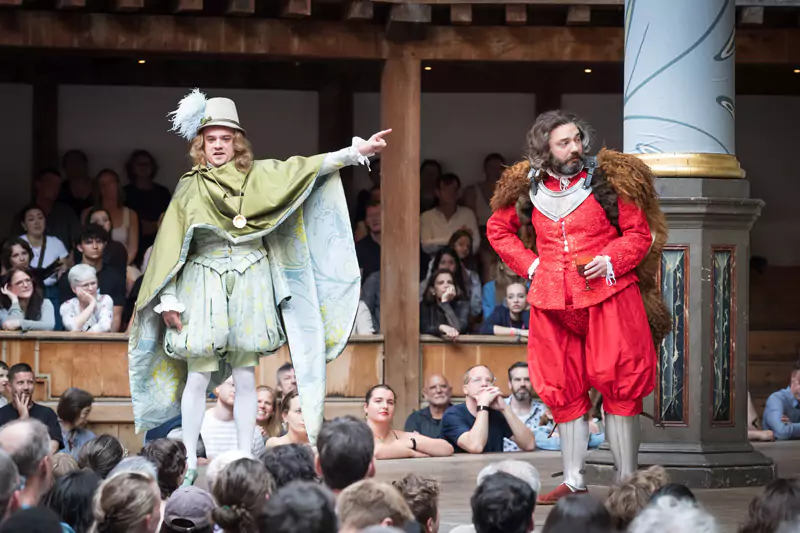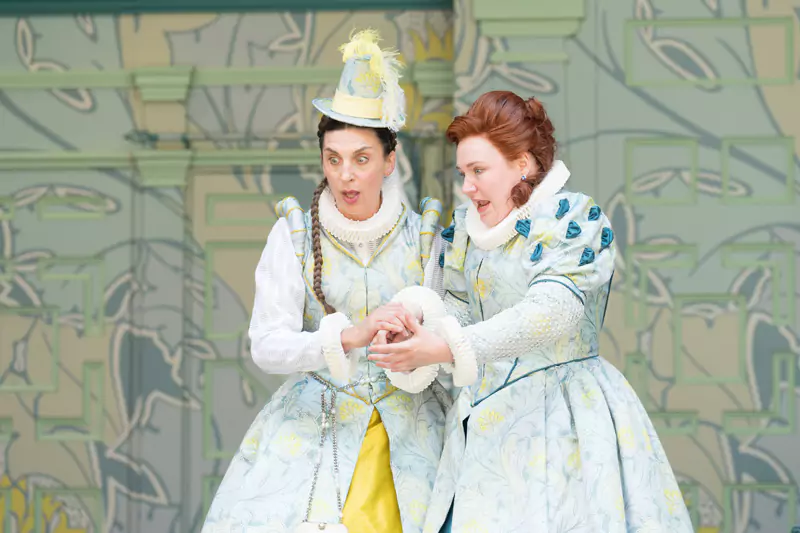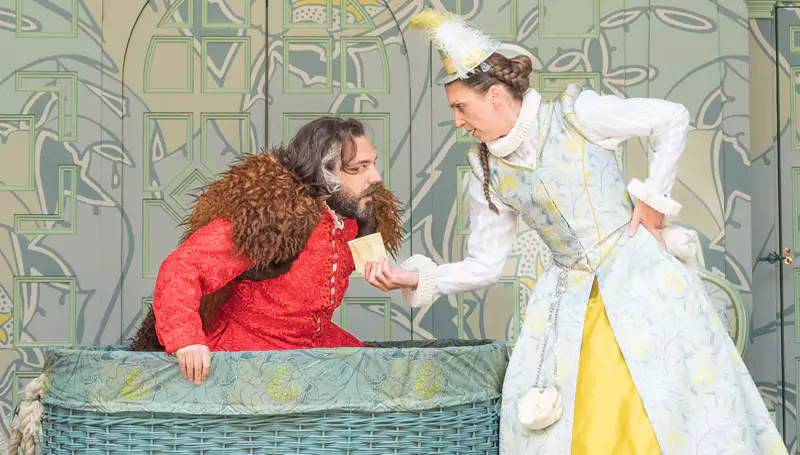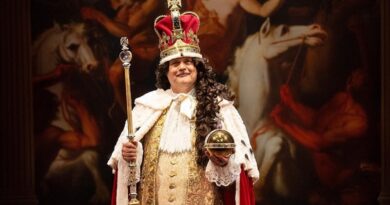“The Merry Wives of Windsor” at the Globe Theatre
Neil Dowden on the South Bank
15 July 2025
The Merry Wives of Windsor may well be the first sequel to a sequel in theatre – and like most sequels it doesn’t live up to the original version. Legend has it that Queen Elizabeth I asked to see Sir John Falstaff in love after his scene-stealing appearances in Henry IV, Part 1 and Part 2 – an offer Shakespeare couldn’t refuse. With his death reported at the start of Henry V, this is not so much a comeback as a time-shifting resurrection since the medieval knight (plus some of his associates) seems to have magically jumped forward a couple of centuries to the late Elizabethan age. But his essential characteristics as a lovable rogue remain intact in Merry Wives where he is more in lust than love, combined with a sort of lazy greed as he comes up with a scheme to live a comfortable old age.

Adam Wadsworth and George Fouracres.
Photo credit: Marc Brenner.
Needless to say, things don’t work out as Falstaff plans. His attempts to inveigle his way into the affections (and purses) of two Windsor women with wealthy husbands – Mistresses Ford and Page – backfire once they compare the identical love letters he sent them. They string him along in order to humiliate him and teach him a lesson – hoist with his own petard as another Shakespearean character said. There’s also a subplot involving the Pages’ daughter Anne. Mother and father have different grooms in mind for her. She has her heart set on another man altogether – but this seems to be padding out a plot that is as thin as Falstaff is fat.
Merry Wives is an easy-going, good-humoured comedy that lacks the darkness that colours most of Shakespeare’s comic plays. The joker Falstaff is very much the butt of the joke – his sleazy scam never a serious threat – with the two merry wives more than capable of seeing him off. In order to escape the jealous rage of Ford they persuade the ageing knight to hide in a basket full of dirty laundry which is then dumped in the Thames, then later he is forced to don women’s clothes in the guise of the “witch of Brentford” but is beaten by Ford. Finally, Falstaff is exposed (if that’s the right expression) in the forest of Windsor Great Park while wearing deer antlers like the ghost of Herne the Hunter as he is attacked by children dressed as fairies. But – unlike Malvolio at the end of Twelfth Night – at the end he is not left out in the cold but invited to “laugh this sport o’er by a country fire”.

Emma Pallant and Katherine Pearce.
Photo credit: Marc Brenner.
Director Sean Holmes emphasizes the agency of the female characters who are running the show – Mistresses Ford and Page not only run rings around Falstaff (and their husbands), but Anne Page marries her chosen one Fenton through her own ingenuity. Holmes does introduce a twist in that Mistress Ford does seem to reciprocate Falstaff’s amorous advances, which maybe gives some justification for her husband’s suspicions – though his possessive behaviour has perhaps pushed her into it. But this is lightly done, with more of a sense of merrymaking than revenge, in a humorous portrayal of a middle-class, small-town community that foreshadows modern TV suburban sitcoms.
Holmes – who has usually created a concept for his Shakespeare productions at the Globe – here wisely does not try to turn Merry Wives into something it isn’t. The show is good, clean (or not-always-so-clean) fun that embraces the play’s knockabout farce with open arms – not to mention its sexual innuendo and national stereotyping. The costumes are almost cartoonish Elizabethan-style, with the colours of the Page family’s clothes matching those of Grace Smart’s elegant set design, William Morris-like wallpaper covering the whole stage area perhaps evoking Falstaff’s medieval origins. Frew’s jazzy, brassy score (including a sousaphone) played by a small band on the balcony helps to make the show go with a swing.
The slightly paunched George Fouracres seems rather miscast as Sir John on first impression – he’s much younger than usual and doesn’t exude a larger-than-life debauched presence on stage – but particularly after Falstaff’s ducking in the river he grows in bombastic hilarity with some neat slapstick and strong rapport with the audience. Katherine Pearce is a surprisingly bold, assertive Mistress Ford, while Emma Pallant gives a funny physical performance as the disapproving Mistress Page (who herself is initially flattered by Falstaff’s love letter until she sees who it’s from). After a slowish start Jolyon Coy gains intensity in his frustrated fits of jealous rage as Ford, while Christopher Logan is much more trusting as the laid-back Page.
While the subplot makes little impact, Wadsworth amusingly doubles as two suitors, the fiery, thickly French-accented (think ’Allo ’Allo) Doctor Caius and the half-hearted milksop Slender, while Samuel Creasey is stereotypically long-winded as the Welsh parson Hugh Evans. And Sophie Russell performs well in the dual roles of Shallow and Mistress Quickly, two fellow survivors from Falstaff’s richly comic theatrical past.









